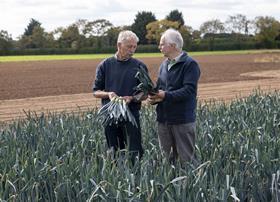
Plant breeders and researchers have gathered to celebrate the 25thanniversary of the discovery of male sterility in leeks – a breakthrough that changed modern farming practices worldwide.
The discovery in 1993 at what was Horticulture Research International, and is now part of the School of Life Sciences at the University of Warwick, led to the development of the hybrid leek.
This marked a move away from open pollination, transforming commercial leek production forever.
The anniversary event was held at Warwick’s Wellesbourne Campus, re-uniteding Brian Smith, former research leader in plant genetics and biotechnology at HRI and Toon van Doormalen, plant breeder for BASF Vegetable Seeds (formerly Nunhems Seeds).
It was Smith and his breeding team who first discovered male sterility in leeks – a key component in the development of hybrid varieties.
The advantages of the hybrid breeding programme are widely recognised, bringing improved yields, better uniformity, and greater resistance to pests and disease. Today around 99 per cent of all leeks grown and consumed are hybrids, demonstrating the huge impact the discovery had.
In addition, it has resulted in the creation of new products such as pre-packaged leeks – only possible with a highly uniform crop.
The event highlighted how complex horticultural research has had a huge commercial impact and ultimately changed both farming practices and public consumption.It included presentations by both Smith and Van Doormalen, followed by a tour of the BASF Seeds trial leek plots.
The event’s co-host Robert Murison, from BASF Vegetable Seeds, said: “We were delighted to be able to re-unite two of the key players in the discovery and development of hybrid leeks: Brian Smith and Toon van Doormalen.
“Their combined expertise and innovation demonstrated how academic research at the former Horticultural Research International and commerce i.e. BASF Seeds have successfully partnered to significantly improve crop performance, so transforming a sector of vegetable farming.”
Smith added:“It took painstaking and meticulous research, viewing many thousands of leeks to find the rare male sterile. I can’t say it was a discovery that came as a blinding flash, but as with all these things there was an element of serendipity.”
“I still have a sense of pride when I visit a supermarket and see the produce that I had a part in developing, I always look at the leeks and onions when I visit.”
The event attracted around 40 delegates from across farming, horticulture and academia.



